NeuronUP, rehabilitation and cognitive stimulation application for professionals
What is NeuronUP?
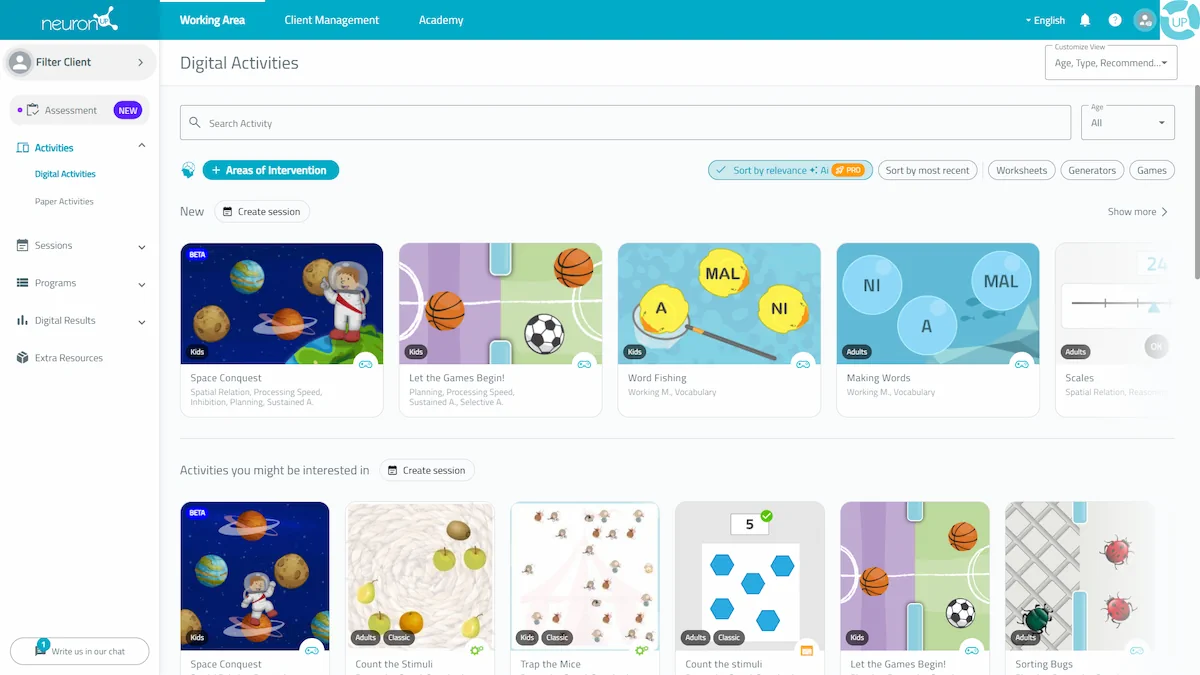
The professional can set up customized sessions for the patient to do from anywhere, being able to monitor them and adapt the exercises based on each individual’s needs.
The platform consists of two main sections:
- Activity workspace: contains plenty of thoroughly classified material to create sessions.
- User and results manager: a database in which you can store all your users and the results of all completed activities in an organized and practical way.
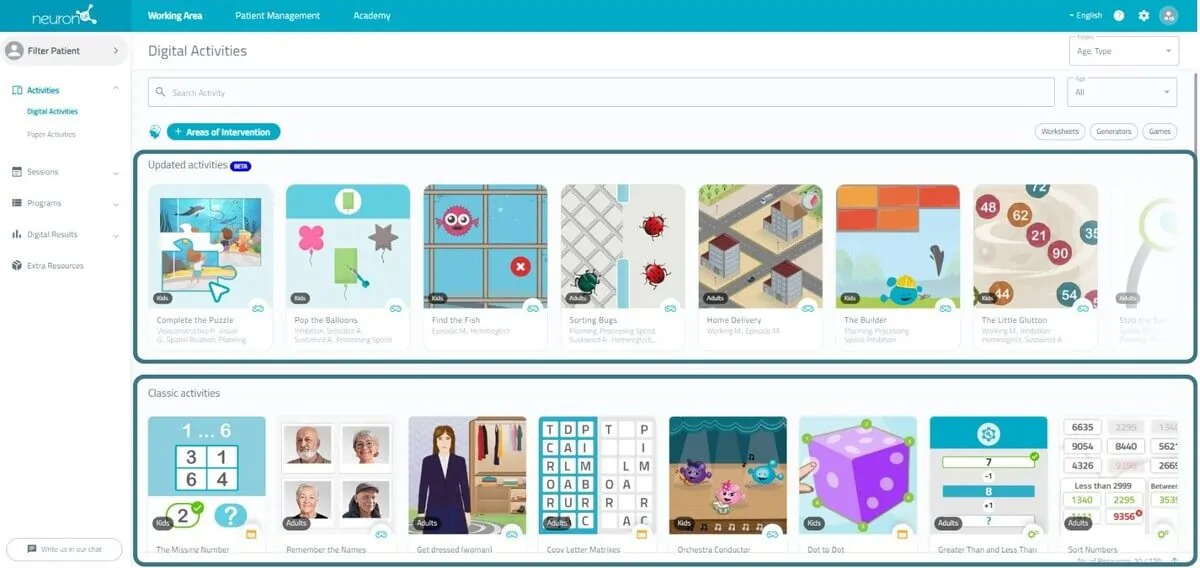
Activity workspace
NeuronUP brings together a wide range of varied materials so that professionals can personally design their interventions, adapting them as much as possible to each patient and their needs.
Thus, there are hundreds of exercises that allow you to train both basic cognitive functions and activities of daily living and social skills. It also includes extra content (image and sound banks, videos, and various apps) that help therapists design their own activities in a more unique and motivating way.
The classification of the activities considers the different areas of intervention previously mentioned, the various degrees of impairment, age, the possibility of individual or group execution, socio-cultural and educational level, and possible sensory limitations.
Presentation mode is also taken into account, so there are two work formats: paper-and-pencil materials and digital materials, which are used on a computer or tablet and can be done on touchscreens.
It should be noted that the material features an attractive and carefully maintained aesthetic, as well as allowing content customization (activity parameters, images, and texts that are meaningful to the user) which has an important motivating effect on adherence to treatment.
All this results in intensive and personalized intervention, adapting to the circumstances and needs of each case.
Sessions and Programs
NeuronUP sessions are sets of activities that run automatically over a period of time defined by the professional. They allow you to quickly design a personalized intervention to meet each user’s needs.
Using sessions, professionals can schedule a work calendar, provide remote intervention, or work with several users at the same time in the same center, which saves a huge amount of time. Also, if a more general intervention is designed, NeuronUP makes it possible to assign the same session to several users with similar characteristics at the same time.
Finally, if you want to plan a long-term intervention, NeuronUP allows you to group sessions into programs with specific tools for managing sessions over long periods of time.
Try NeuronUP free for 7 days
You’ll be able to work with our activities, design sessions, or rehabilitate remotely
User and results manager
Administrative processes are one of the foundations of any well-functioning center. This organization of patients must be done quickly and easily so that professionals can focus as much as possible on working with their patients. NeuronUP allows you to keep a record of all the center’s users, their clinical history, and their results in a very simple way, which can be checked at any time and from anywhere.
The clinical history of your users accessible from anywhere
With NeuronUP, it is not necessary to use several programs or use a specific computer to consult users’ clinical histories. The user manager lets you view the anamnesis, reports, and medical documents of your users from a single online location; using a tablet or computer, the professional can check a person’s clinical history wherever they are.
Complying with data protection laws
Unlike other cloud-based storage programs, NeuronUP strictly complies with data protection regulations, ensuring all your client information remains protected and completely confidential.
Anonymizing clinical history records
Each center is different, as are its privacy needs, which is why NeuronUP offers the option to replace patients’ personal information with a code to ensure anonymity. This can also be very useful in certain research contexts.
Personalized monitoring thanks to the Results Manager
The tool allows you to update the user’s diagnosis in their profile, upload reports, medical tests, or any other document that may be useful to the professional. In addition, NeuronUP automatically records exhaustive quantitative results of all computer-based activities and facilitates the professional’s entry of qualitative observations to supplement the information.
All of this makes it possible to keep track of the user’s activities, easily consult any result, and quickly and effectively check how they are evolving in different areas.
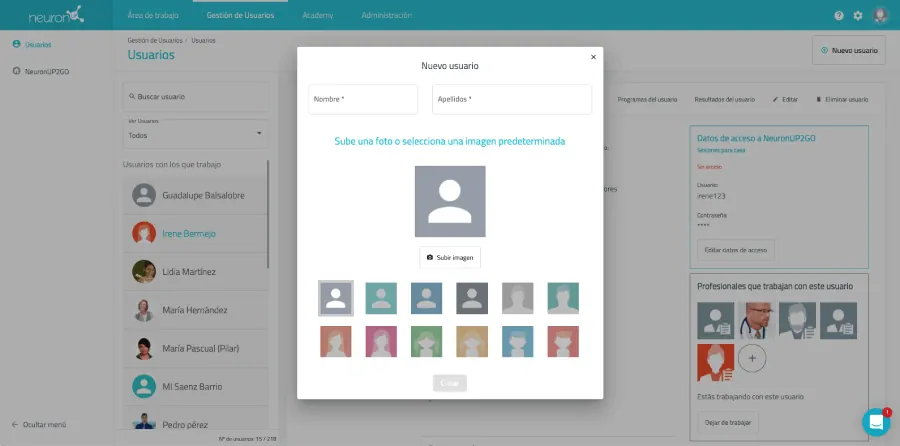
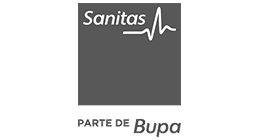
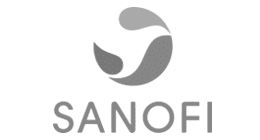

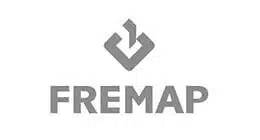

Theoretical framework
NeuronUP is supported by a consistent theoretical framework overseen by a scientific committee of experts.
It is based on the premise of NEUROPLASTICITY, which is the brain’s potential to modify and adapt in response to experience, chemicals, hormones, or injuries. This ability of the brain to reorganize itself, creating and strengthening neuronal connections, is the key to recovery. While the system itself can activate neuroplastic mechanisms, they have their limits, making it necessary to stimulate and modulate them, which is achieved through appropriate therapeutic intervention.
Types of intervention with NeuronUP
Neuropsychological rehabilitation
The ultimate goal of neuropsychological rehabilitation is for the person to recover their lost abilities as much as possible and develop new ones necessary to achieve the highest degree of functionality and independence possible, both physically and psychologically, as well as social adaptation. It is aimed at people who have suffered a brain injury or have neurodevelopmental disorders, intellectual disability, or mental illness, among other pathologies.
Cognitive stimulation
The purpose of cognitive stimulation is to slow cognitive decline and maintain and reinforce preserved abilities. It is applied in neurodegenerative diseases and normal aging.
Ecological validity and generalization in therapy
When designing the material, the following concepts were also taken into account:
- ECOLOGICAL VALIDITY, which refers to the match between improvement in the skills trained in consultation and its relationship to better performance in daily life activities,
- and GENERALIZATION, meaning that the results produced by training in certain tasks are also evident in similar ones, thereby demonstrating that what actually improved is the underlying function.
Each therapeutic intervention must be unique, as it depends on factors as diverse as the type of impairment, the individual’s personal characteristics and circumstances, or the particularities of the professional carrying out the intervention. In this way, it is the professional who decides what type of activities each patient should do, how long each will last, and how tasks will be sequenced by difficulty. Therefore, NeuronUP provides tasks thoroughly classified by processes, leveled based on the complexity of the demand, and customizable, enabling the professional to design a much more precise and effective rehabilitation/stimulation program.
For more information, consult our theoretical framework.